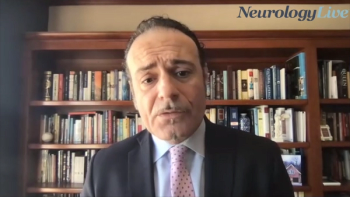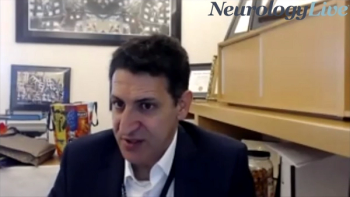
The director and founder of the Sleep Centers of Middle Tennessee discussed his team’s efforts to further patient understanding of obstructive sleep apnea.

The director and founder of the Sleep Centers of Middle Tennessee discussed his team’s efforts to further patient understanding of obstructive sleep apnea.

There were no significant treatment group differences for measures of Alzheimer disease regional atrophy, cerebral blood flow, or mean fractional anisotropy.

Episode 8 of the AUPN Leadership Minute features Rohit Das, MD, of University of Texas Southwestern Medical Center at Dallas; and Robert M. Pascuzzi, MD, of Indiana University School of Medicine. [WATCH TIME: 4 minutes]

The FDA cited a lack of statistical significance in some of the subgroups of dementia, and insufficient numbers of patients with certain less common dementia subtypes as lack of substantial evidence of effectiveness to support approval.

The consultant in the department of neurology at Mayo Clinic discussed Parkinson Disease Awareness Month and the benefits behind social initiatives that raise awareness.

Here's what is coming soon to NeurologyLive.

The duo from Montefiore Medical Center discussed aspects of their recently published recommendations on neonatal seizure diagnosis that need further examining.

The randomized, double-blind, placebo-controlled trial will enroll approximately 2900 people with migraine and will evaluate the efficacy and safety of 100- and 200-mg zavegepant.

The professor of clinical neurology at University of Miami and MT2020+ chair, and president of Medtronic's Neurovascular Business discussed the effort to improve global accessibility of mechanical thrombectomy.

Researchers from Jefferson Health developed predictive models to assess risk of kidney injury and stroke after surgery.

Researchers found improvements in SIB and NPI score between high-dose and placebo groups.

Neurology News Network for the week ending April 3, 2021.

Researchers on the FDA’s advisory committee conducted a review of the studies and evidence ahead of the treatment’s PDUFA date on June 7, 2021.

A series of video modules aims to address the unique challenges faced by nursing professionals caring for patients with MS in rural areas.

Take 5 minutes to catch up on NeurologyLive's highlights from the week ending April 2, 2021.

A recently completed phase 1 program found that ITI-1284 ODT-SL was rapidly absorbed into the systemic circulation, was metabolically stable, and resulted in high systemic exposure.

An update on the phase 1b study of Pfizer’s investigational DMD treatment was presented at the MDA 2021 conference.

The chair of neurology and Olemberg Family Chair of Neurological Disorders at the University of Miami Miller School of Medicine detailed a number of presentations from ISC 2021.

Compared to participants who never experienced a head injury, a history of a single prior head injury was associated with a 1.25 times increased risk of dementia.

The SINBAR EMG, percentage of RWA from mentalis tonic and any activity, and percentage of RWA from FDS phasic activity all correlated with both disease duration and levodopa-equivalent dose.

Researchers conducted a post-hoc analysis of Study 19 to determine hazard ratios of milestone occurrences in amyotrophic lateral sclerosis.

Solomon L Moshe, MD, and Elissa Yozawitz, MD, from Montefiore Medical Center, discussed ways of reducing misdiagnosis of neonatal seizures and the future work needed to be done in this space.

A recent publication describes the findings of two initiatives to evaluate and raise awareness about the impact that SMA has on adolescents and young adults.

The director of the Lou Ruvo Center for Brain Health and neurologist at Cleveland Clinic discussed whether lenalidomide, a repurposed cancer drug, has promise as an Alzheimer disease DMT.

Just over half (53%) of patients treated with the amantadine extended-release agent had greater than 50% reduction in time spent ON with dyskinesia and just over a quarter (27%) of patients had greater than 75% reduction.

The duo from the National Institutes of Health discussed the advantages of the ultra-high resolution imaging technology in research.

Preliminary results from the IGNITE-DMD trial also showed a decreased in creatine kinase levels and improvements on NSAA and PODCI.

Progressive forms of multiple sclerosis present a number of challenges for MS specialists, the biggest of which being whether or not disease-modifying therapy is required.

The postdoctoral researcher at Columbia University discussed the long-term plans to gain a better understanding of MS diagnosis disclosure and how it can impact other qualities of life.

Researchers studied associations between obstructive sleep apnea and varied markers of adiposity.